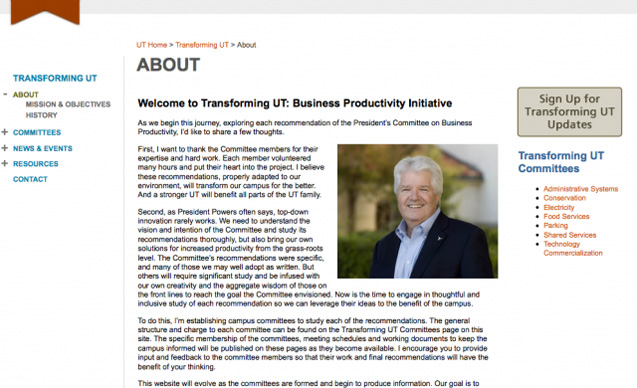Educational institutions are no longer safe from the reaches of profiteers. For the University of Texas at Austin, the “Smarter Systems for a Greater UT” is the newest move by the administration to treat the university not as a school but rather as a business.
Introduced early this year by UT President Bill Powers as a way for the university to survive state budget cuts, the school’s so-called Business Productivity Initiative seeks to foster an educational system that is “reformed and always reforming.” In his January 29 speech, Powers said business operations and efficiency have always been a part of UT’s story and that the ideas proposed by 13 business leaders would save the university as much as $490 million over a decade.
But if we correctly consider businesses as organizations that work contrary to the interests of most people — in this case especially, the consumers — then Powers will achieve his goal. The Business Productivity Initiative will harm students greatly, in addition to faculty and workers.
According to Powers and his team, the plan will help run the university using less resources. Currently the state only funds 13 percent of UT’s costs, which is a problem in itself. But rather than prioritize the necessary costs of the university, the administration has turned to outsourcing all non-academic functions of the university in order to save money.
For concerned students like computer science sophomore Mukund Rathi, this is an issue that should not be overlooked by the community.
“Education is a public good, and the more selective it becomes, the more selective our success prospects will become,” Rathi said. “This plan takes education out of the right hands and into the hands of businessmen.”
The report is the epitome of the 1 percent ruling the 99 percent, Rathi added.
“The committee’s chairman is from Accenture, and this company’s negative effect on Texas’ food-stamp program shows what happens when businessmen are in charge.”
Active protesters like Rathi and UT senior Michelle Uche said it is necessary to bring as much attention to the university’s profiteering efforts as possible.
“When this plan is implemented at UT, it will show other universities that they can also do whatever they want to cut costs while making a profit,” Uche said. “The administration says that it will save money, but the president never talks about the actual math of the report or what the human toll will be.”
In the plan, three areas of the University of Texas system will be targeted: Asset Utilization, Technology Commercialization and Administrative Service Transformation. Each of the areas has a group of either students, faculty, staff — or even all three — that will be penalized in the push to save costs.
“Asset Utilization” focuses directly on UT’s constituents, and introduces ways to make greater profits from parking, food and housing. It was noted at the start of the plan’s business report that these areas are functioning well enough for the UT community and do not require change. Yet the Smarter Systems measure would either raise the prices to “market rates” – rates that are found in competitive industries outside the UT campus – or privatize those services altogether, putting them into the hands of companies not directly associated with the university.
Having their food, parking and basic living costs increase would put further strain on already cash-strapped students, and would also result in significant worker layoffs – a projected 64 percent in reduction in food and housing staff at the university.
The plans for “Technology Commercialization” and “Administrative Services Transformation” would consolidate and prioritize the school’s academic departments. Once the plan is implemented, research initiatives will be evaluated and the ones that are deemed most profitable in various industries will be moved to the top of the funding list. This means liberal arts majors and departments will be given minimal funding if the benefits of those studies aren’t seen as being profitable to UT.
Consolidation within information technology services may indeed save the university money after layoffs go into effect, but limiting access to these services will hinder students’ and faculty’s ability to correct tech problems quickly.
Rathi said UT community members need to care about the impacts of a plan that will be directly affecting their livelihoods. Until now, though, the administration is successfully pulling off the heist without outrage from students, faculty or workers.
“The simple fact is that ‘privatization’ means that instead of socializing the costs of education to society, to which the benefits of education would ultimately flow when we graduate and get jobs, the costs will be privatized to individuals and their families,” Rathi said.
“This is a plan to save money, but they don’t bother to explain to us how they plan on doing this.”

Defying Trump’s right-wing agenda from Day One
Inauguration Day is coming up soon, and at Truthout, we plan to defy Trump’s right-wing agenda from Day One.
Looking to the first year of Trump’s presidency, we know that the most vulnerable among us will be harmed. Militarized policing in U.S. cities and at the borders will intensify. The climate crisis will deteriorate further. The erosion of free speech has already begun, and we anticipate more attacks on journalism.
It will be a terrifying four years to produce social justice-driven journalism. But we’re not falling to despair, because we know there are reasons to believe in our collective power.
The stories we publish at Truthout are part of the antidote to creeping authoritarianism. And this year, we promise we will kick into an even higher gear to give you truthful news that cuts against the disinformation, vitriol, hate and violence. We promise to publish analyses that will serve the needs of the movements we all rely on to survive the next four years, and even build for the future. We promise to be responsive, to recognize you as members of our community with a vital stake and voice in this work.
Please show your support for Truthout with a tax-deductible donation (either once today or on a monthly basis).
